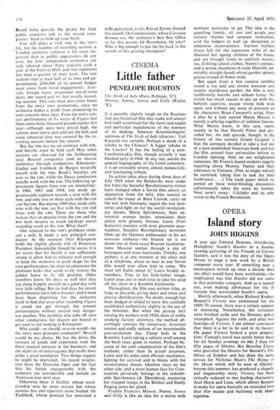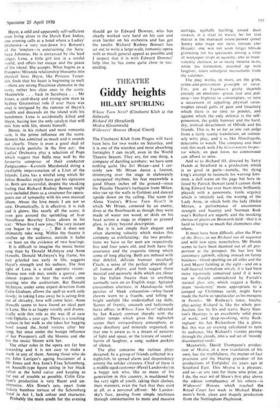OPERA
Island story
JOHN HIGGINS
A year ago Edward Downes, introducing Humphrey Searle's Hamlet to a Sunday evening gathering of the Friends of Covent Garden, said it was the duty of the Opera House to stage a new work by a British composer every year. If something near a -masterpiece turned up once a decade then the effort would have been worthwhile—the implication was that Hamlet did not come in that particular category. And so it turned out, even making allowances for the ill fortune that surrounded Searle's opera.
Shortly afterwards, when Richard Rodney Betuiett's Victory was announced for the 1969/70 season, there was a certain amount of muttering. Nonetheless, the criticisms were brushed aside and the Downes policy triumphed. Against the odds, and after two hearings of Victory, I am almost convinced that there is a lot to be said in its favour. On paper Victory looked a poor proposi- tion: Conrad's novel was surely better meat for six Sunday evenings on sec 2 than for fifty pages of libretto. But Beverley Cross, who provided the libretto for Bennett's The Mines of Sulphur and has done the same service for Nicholas -Maw's The Rising of the Moon which will be seen at Glynde- bourne this summer, has produced a shapely and stageworthy story. Victory has been virtually reduced to two leading characters, Axel Heyst and Lena. which allows Bennett to make his opera basically an extended love duet (for mezzo and baritone) with inter- ruptions.
Heyst, a cold and apparently self-sufficient man living alone in the Dutch East Indies, one evening calls at a hotel where a Ladies' Orchestra—a very run-down Ivy Benson's of the 'nineties—is entertaining the Sura- baya Johnnies. He is entranced by the lead singer, Lena, a little girl lost in a sordid world, and offers her escape and the peace of his island. She accepts. What begins as a Prospero/ Miranda relationship blossoms into physical love; Heyst, like Princess Turan- dot, finds that his heart is beginning to melt —there are strong Puccinian elements in the story, rather less clear ones in the score. Meanwhile . . . back in Surabaya . . . Mr Jones, a card-sharp and strong-arm man (a Sydney Greenstreet role if ever there was one) is intrigued by the rumour of Heyst's wealth and descends on the island with his henchmen. Lena is accidentally killed and Heyst, having lost the only catalyst that will mix him with life, shoots himself.
Henze, in his richest and most romantic vein, is the prime influence on the score. Bennett has admitted as much and it sounds out clearly. There is even a good deal of Henze-style pastiche in the first act: the Ladies' Orchestra play a selection of Pops which suggest that Balfe may well be the favourite composer of their conductor Zangiacomo—Kenneth Macdonald doing a creditable impersonation of a Liszt of the Islands; Lena has a wistful song which Sir Julius Benedict might have put his signature to. Both are successful, despite the sneaking feeling that Richard Rodney Bennett might have included them as a sweetener tor opera- goers out of sympathy with his own musical idiom. About the love music I am not so sure. Dramatically, it is effective; it is rich and it glows, like nearly all the score; it even gets around the sprinkling of Ivor Novelloese Beverley Cross allows in his text: 'When first I saw you,/The very instant you began to sing . . .'. But it does not ultimately take wing. Within the theatre it catches up the audience, outside it fades —at least on the evidence of two hearings.
It is difficult to imagine the music better sung than by Donald McIntyre and Anne Howells. Donald McIntyre's big frame, his hair grizzled too early in life, suggests Heyst's strength and his sadness. The first sight of Lena is a stock operatic vision: 'Donna non vidi mai, simile a questa', one almost expects to hear the words come pouring into the auditorium. But Donald McIntyre, under some expert direction from Colin Graham, allows the spell to work only slowly; in taking Lena away he is acting first out of chivalry, love will come later. Anne Howells seems to have found an ideal part in Lena. She is as happy vocally and drama- tically with this role as she was ill at ease with Ophelia a year ago. There is a touching sadness in her walk as she takes her begging bowl round the—hotel visitors after her song; but once under the benign influence of her Prospero's cell she blooms and she lets the music bloom with her.
The other roles in the opera are far less rewarding and it is not easy to make a mark in any of them. Among those who do are John Lanigan's ageing buccaneer of a Mr Jones and Ava June's Frau Schomberg, an Anouilh-type figure sitting in her black velvet at the hotel caisse and keeping as far out of trouble as possible. Colin Gra- ham's production is very fluent and un- obtrusive. Alix Stone's sets, apart from rickety bamboo terrace of the Schomberg hotel in Act 1, lack colour and character.
Probably the main credit for the evening should go to Edward Downes, who has clearly worked very hard on his cast and even harder on his orchestra and has got the results. Richard Rodney Bennett has set out to write a large-scale, romantic opera with as much general appeal as possible and I suspect that it is with Edward Downes' help that he lias come quite close to suc- ceeding.







































 Previous page
Previous page